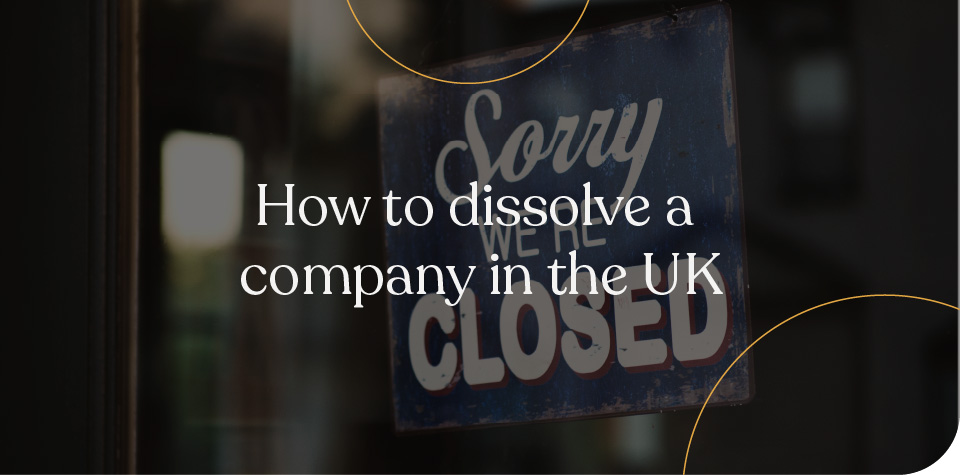
How to dissolve a company in the UK?
Companies House register is the public registry that displays official company information.
It is a harsh truth that not all businesses can last forever and you may need to dissolve your limited company.
This could be for a variety of reasons, such as your business might have been very successful, but it may now have outlived its purpose.
If you need a business loan, we can get you approved in just 24 hours, start online below:
Does dissolving work the same way as liquidation?
No. liquidation is not the same as dissolving a company. If there is no outstanding debt or any other liabilities, company dissolution can be used to close the company.
Different liquidation procedures exist. Liquidation is the best option if your company cannot pay its debts. Liquidation is removing business assets from a company and selling them to make as much money as possible. This money can then be used to pay any outstanding debts such as business loans taken out and all other finance.
Only a licensed insolvency practitioner can enter into liquidation on your behalf.
Is there anything that can stop my company from being dissolved and liquidated?
Anybody can object to your proposed dissolution process. Your creditors should object to your dissolution application if your company owes money. The Registrar will reject your application if it is not upheld. A creditor may apply for a court order to reinstate your company to the registry if you have not paid them.
It is important to inform everyone about your intention to dissolve the business and make sure all creditors have been paid.
You may have to stop the proceedings because you are the company directors of the company. If your company changes its name or continues trading, or becomes insolvent, you must withdraw your application. You must complete form D02.
Although it may seem like a drastic decision to make, there are many reasons that it is possible. Company dissolution can be used to end a business’s natural life or solve its financial problems.
If you are considering taking this step, there are many things to consider and some must-knows.
What does it mean for a company to be liquidated?
A company can be dissolved by formally closing it. The process of “striking off” (removing) a company’s Companies House registration is called dissolution.
This can be the simplest way to close down a company once its directors decide it shouldn’t trade anymore.
It can be hard to get a large or small business loan if you have dissolved a company so remember this before liquidating. You may have to look into alternative finance such as b2b finance, where one business lends to another.
What is the purpose of dissolving a company?
A company can be liquidated for both voluntary and involuntary reasons.
Sometimes, voluntary dissolution occurs when directors decide that the company no longer serves its original purpose.
This could also occur if partners are unhappy and cannot agree on the direction of the company’s future. If it becomes difficult to maintain the finances, directors may decide to close down a company.
Insolvency is a condition in which a company’s cash flow issues or balance sheet problems mean that bills and other debts cannot be covered.
Companies House can also legally dissolve companies not complying with their corporation tax returns or accounts.
Can a company with debts be dissolved?
Yes, but within very strict limits.
A company can use the dissolution process if it has no outstanding debt. However, company directors must show that they can repay the debts within 12 months. The directors must sign a “declaration of solvency”, which promises that the company can repay its debts within the specified time.
Notifying creditors about the plans to dissolve the company is crucial. Failure to do so can lead to serious legal consequences.
A liquidation is an option if outstanding debts cannot be paid within 12 months.
Is a director personally liable for a company’s failure? They may be if they have a personal guarantee in place securing debts.
Can a company which has been dissolved continue to operate?
No, dissolving a business means closing it completely.
You would close the company’s bank accounts and no longer trade.
It is illegal to trade after a company is removed from Companies House’s register and companies house website.
Directors of companies that are still active can face serious legal consequences.
It is possible to return a company to Companies House, but it is not possible to do so if the name hasn’t been taken since the date it was struck off.
Liquidation, on the other hand, means that the name cannot be used anymore.
Can HMRC pursue a dissolved company?
Yes, HMRC can take action even if a company is dissolved.
The process of dissolution involves paying corporation tax bills, filing the company tax return and providing up-to-date accounts. These things are monitored closely by the tax office.
HMRC and other creditors can still pursue companies to recover unpaid debts even after they have been dissolution.
Can you dissolve a business voluntarily?
Companies House requires that anyone who wishes to dissolve their business voluntarily fulfill certain conditions.
It will, for example, accept strike-off applications if a company has not traded in the past three months, has not changed its name in the last three months, has no existing debt repayment agreements in effect, and isn’t under threat of liquidation.
To properly close a company, there are certain things that must be done. More information is available on the Companies House website.
What are the disadvantages of dissolving my business?
Although dissolving a company might seem simple, it is important to be cautious. False information, whether intentionally or not, in your application can lead to severe consequences. Director disqualification can result in a substantial fine or imprisonment.
If a creditor believes your company was not closed through the proper channels or has other legitimate reasons for opposing the closure they can apply for your company’s reinstatement to the Companies House register.
They would then be able to pursue your company’s unpaid debts and any other creditors through this appeal. A formal liquidation is another option.
Insolvency practitioners will oversee the liquidation and ensure that the company’s assets are realised to the maximum extent possible. This will also ensure fair distribution of the money among creditors.
Disgruntled creditors will not be able to petition the company for restoration if the winding down of a company is handled by an insolvency practitioner licensed to do so.
You should consult a professional if you have any questions about whether or not you qualify for dissolving a company.
They can also help you determine the best way to proceed with the paperwork.

